The European Central Bank surprised markets on Thursday with fresh measures to boost a flagging eurozone economy threatened with deflation and the risks of an escalating conflict in Ukraine.
Policymakers cut the already ultra-low main interest rate from 0.15% to 0.05%. They also made it more expensive for banks to park money with the ECB – cutting the deposit rate, which was already negative, from -0.1% to -0.2% in the hope of persuading banks to lend more to businesses and consumers.
The action took investors by surprise and drove the euro down more than two cents against the dollar to a 14-month low of $1.29. A weaker currency helps the eurozone's exporters.
In London the Bank of England held rates at a record low of 0.5% for the 66th monthly meeting in a row.
European stock markets rose following the decisive action from the ECB president, Mario Draghi, and his colleagues on the governing council. The FTSEurofirst 300 index, which tracks the biggest companies across the region, rose 1.2% to its highest close since January 2008.
"The ECB stepped up to the plate as the eurozone recovery is grinding almost to a halt," said Christian Schulz, a senior economist at the German bank Berenberg.
The central bank announced further measures to encourage lending by buying asset-backed securities. Full details will be published in October, Draghi said.
The ECB stopped short of embarking on full-scale quantitative easing (QE) which would potentially involve the bank purchasing government debt.
Draghi revealed the 24-strong governing council was split over the package of new measures, but said a "comfortable majority" was in favour. It is thought that Jens Weidmann, the president of Germany's Bundesbank, was opposed.
Speaking at a press conference following the decision, he said the eurozone's member states were also divided over QE.
"QE was discussed. Some members of the governing council were in favour of doing more, and some members were in favour of doing less. So our proposals strike the mid road." Draghi said interest rates would not be cut further.
Carsten Brzeski, an economist at ING, said: "With another rate cut, an ABS purchasing programme and a new covered bond purchasing programme, the ECB has now reached a point at which fully fledged QE, ie outright purchases of government bonds, is the only option left."
The ECB nudged down its forecast for eurozone growth this year to 0.9%, from an earlier forecast of 1%. It also revised down its growth forecasts for 2015 to 1.6%, from 1.7%, but it revised up its forecast for 2016 to 1.9%, from 1.8%.
It lowered its forecast for inflation this year to 0.6% from a previous forecast of 0.7%, but Draghi said policymakers did not expect outright deflation, despite a current inflation rate of just 0.3%.
The ECB left its inflation forecast for 2015 and 2016 unchanged at 1.1% and 1.6% respectively.
There was zero growth in the eurozone economy in the second quarter, following 0.2% growth in the first quarter. Fears are mounting that rising tensions between the west and Russia, fuelled by the alleged presence of Russian troops in Ukraine, will derail the weak recovery.
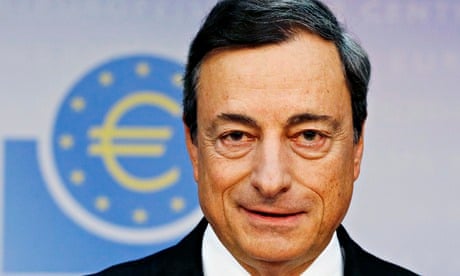

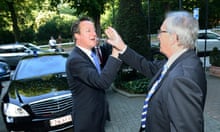
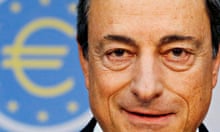
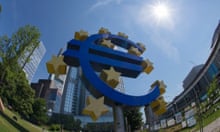
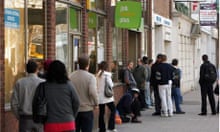

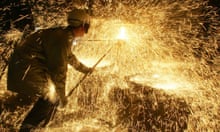
Comments (…)
Sign in or create your Guardian account to join the discussion